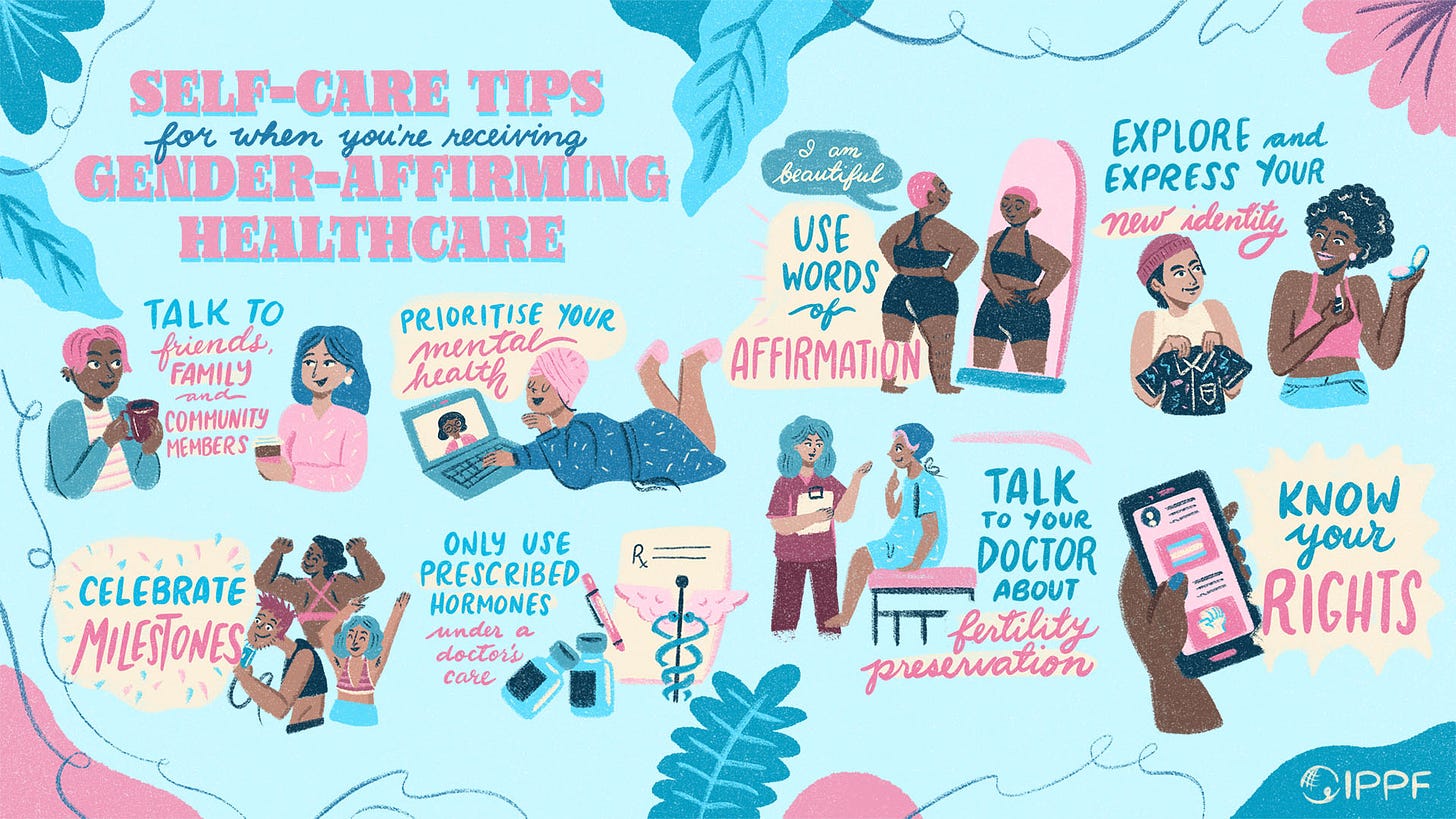The emerging trend of transableism
Surgeries to align physical states with perceived identities raise ethical and medical questions about bodily autonomy and healthcare decision-making.
In a case report published in a medical journal two weeks ago, a doctor in Quebec, Canada described the amputation of two healthy fingers from a young man so desperate to remove the digits that he contemplated building his own guillotine to do the job himself.
Dr. Nadia Nadeau, of Université Laval, wrote that the 20-year-old ambidextrous man thought his left hand’s fourth and fifth fingers “should not belong to his body, a feeling present since childhood. He hides his fingers, keeps them flexed, leading to impaired dexterity, localized pain, irritability, and anger.”
The doctor said the patient suffered from nightmares featuring his fingers rotting or burning and had daily, intrusive, finger-related thoughts. “Following amputation, the patient experienced immediate relief, with nightmares ceasing, emotional distress subsiding, and improved functionality,” she reported.
This is not the first case of such a surgery. And, worryingly, it’s unlikely to be an isolated incident.
But could it become a trend? Does it set a dangerous precedent? Is it an example of the sad state of mental health and healthcare, or is it the ultimate expression of personal sovereignty?
Welcome to the new frontier of “transableism” — which takes the concepts of ‘personal identity’ and ‘bodily autonomy’ to new heights. It essentially boils down to being disabled by choice.
Transableism is a term that smacks more of advocacy than medicine. Previously, the psychological condition of identifying with being disabled so much that you would desire amputation, paralysis, or another physical impairment was known as Body Integrity Identity Disorder (BIID).
Even before the advent of that diagnosis, in the 1970s, John Money — a psychologist at Johns Hopkins — published the first modern case history of the state of being attracted to being an amputee. He termed it "apotemnophilia" — from the Greek words apo (“away”) + témnō (“cut”) + the suffix -philia (“love for”).
This gradual shift in terminology — from a ‘philia’ to more ‘ableist’ language — is similar to how the condition of "gender dysphoria" was relabeled "transgenderism," and how “sex reassignment surgery” was renamed “gender-affirming care.” Whatever it’s called, it still means a knife and life-altering changes at the end of the day.
Almost a quarter century ago, the bioethicist Dr. Carl Elliott wrote an article in the Atlantic Monthly exploring the psychological and ethical underpinnings of apotemnophilia.
In hindsight, it appears he was at the leading edge of identifying processes we see well entrenched in society today.
“What prompts people to conceptualize themselves as amputees?” he asked. “And at a time when identity seems so malleable, when so many people profess uncertainty about who they really are, is it possible that the desire for this particular identity might spread?”
When he wrote the article, Dr. Elliott said BIID appeared to be exceedingly rare, at least when looking at the literature or talking to medical professionals. But when he turned to internet chat rooms and bulletin boards, he found a whole new world of obsession:
It took me months to track down even a handful of scientific articles on the desire for amputation. It took about 10 seconds to find dozens of Web sites devoted to the topic… [At one time] people with unusual desires could live their entire lives without knowing that there was anyone else in the world like them. Today all it takes is a computer terminal.
He also wondered why some pathologies seem to arise as if from nowhere and whether the mere description of a condition can make it contagious? For example, why did young men in late-19th-century France begin “lapsing into a fugue state, wandering the continent with no memory of their past, coming to themselves months later in Moscow or Algiers with no idea how they got there,” he asks? What was it about America in the 1970s and 1980s that made it possible for thousands of people to believe they had multiple personalities?
Today, we would use the words “social contagion.” In 2000, to decode what was happening Dr. Elliott turned to the work of the late Canadian philosopher, Ian Hacking, who specialized in the philosophy of science.
Hacking had a persuasive argument, Dr. Elliott believed. It was the doctors:
… psychiatrists and other clinicians helped to create the epidemics of fugue in 19th-century Europe and multiple-personality disorder in late-20th-century America simply by the way they viewed the disorders — by the kinds of questions they asked patients, the treatments they used, the diagnostic categories available to them at the time, and the way these patients fit within those categories.
[Hacking] points out, for example, that the multiple-personality-disorder epidemic rode on the shoulders of a perceived epidemic of child abuse, which began to emerge in the 1960s and which was thought to be part of the cause of multiple-personality disorder. Multiple personalities were a result of childhood trauma; child abuse is a form of trauma; it seemed to make sense that if there were an epidemic of child abuse, we would see more and more multiples.
In today’s culture of “gender-affirming care,” healthcare professionals push interventions that help people align various aspects of their lives — including biological and emotional ones — with their identity. This sounds like a perfect parallel to psychologists in the 1970s helping patients make sense of their disordered brains by explaining they had “split” or “multiple” personalities.
Using Hacking’s work, Dr. Elliott focuses on the "looping effect" or, how a classification affects the thing being classified. People are conscious of the way they are classified, and thus alter behavior and self-conceptions in response to their classification. In other words, a self-amplifying feedback loop is formed:
In the 1970s… therapists started asking patients who they thought might be multiples if they had been abused as children, and patients in therapy began remembering episodes of abuse (some of which may not have actually occurred). These memories reinforced the diagnosis of multiple-personality disorder, and once they were categorized as multiples, some patients began behaving as multiples are expected to behave. Not intentionally, of course, but the category "multiple-personality disorder" gave them a new way to be mad.
By attempting to help patients, Dr. Elliott says psychiatrists “may be unwittingly colluding with broader cultural forces to contribute to the spread of a mental disorder.”
The comparison between the people who told Dr. Elliott of their need for limb amputation and the people today who are convinced of their need for “gender-affirming care” cannot be ignored.
"I didn't understand why, but I knew I didn't want my leg,” one woman in her 40s told Dr. Elliott. “I will never feel truly whole with legs." Dr. Elliott said the patient always viewed herself as a double amputee, with stumps of five or six inches.
This sounds a lot like a transgender woman named Alexa, who wrote in a guest post for the ACLU Indiana:
The hormones didn't change my brain, they changed my body to finally match my brain. And, the more I saw the real me in the mirror, the more my anguish faded. Gender affirming health care literally saved my life.
A 2000 BBC documentary about body dysmorphia called Complete Obsession profiled Dr. Russell Reid, a consultant psychiatrist in the UK who specializes in treating trans people. He made the parallel between trans people and those with BIID very clear:
Certainly when I first heard of people wanting amputations it seemed bizarre in the extreme but then I thought well, I see transsexuals and transsexuals want healthy parts of their body removed in order to adjust to their idealized body image and so I think that was the connection for me. I saw that people wanted to have their limbs off with equally as much degree of obsession and need and urgency and it was a powerful emotion.
It would seem that our permissive and enabling psychological approach, combined with heretofore unthinkable surgical ability, has actually created an epidemic of self-mutilation.
“To be honest,” Dr. Elliott writes, “haven't surgeons made the human body fair game? You can pay a surgeon to suck fat from your thighs, lengthen your penis, augment your breasts, redesign your labia, even (if you are a performance artist) implant silicone horns in your forehead or split your tongue like a lizard's. Why not amputate a limb?”
If society accepts the surgical alteration of body parts for cosmetic reasons, or for gender affirmation, do we then open the door to any form of bodily modification, including those that impair function, for any reason at all? Do we even have a place to challenge what an adult of sound mind chooses to do with their body? The debate then extends to whether such interventions should be performed on minors, challenging not just the ethical boundaries of medical practice but of societal norms.
Dr. Elliott concludes by expressing his concerns of creating a slippery slope that has very little oversight built into it:
Psychiatry and surgery have had an extraordinary and very often destructive collaboration over the past 75 years or so: clitoridectomy for excessive masturbation, cosmetic surgery as a treatment for an "inferiority complex," intersex surgery for infants born with ambiguous genitalia, and—most notorious—the frontal lobotomy. It is a collaboration with few unequivocal successes. Yet surgery continues to avoid the kind of ethical and regulatory oversight that has become routine for most areas of medicine.
If the proposed cure for apotemnophilia were a new drug, it would have to go through a rigorous process of regulatory oversight. Investigators would be required to design controlled clinical trials, develop strict eligibility criteria, recruit subjects, get the trials approved by the Institutional Review Board, collect vast amounts of data showing that the drug was safe and effective, and then submit their findings to the U.S. Food and Drug Administration. But this kind of oversight is not required for new, unorthodox surgical procedures. (Nor, for that matter, is it required for new psychotherapies.) New surgical procedures are treated not like experimental procedures but like "innovative therapies," for which ethical oversight is much less uniform.
When Dr. Elliott was writing his article 24 years ago, little was understood about apotemnophilia. “Nobody understands the pathophysiology; nobody knows whether there is an alternative to surgery; and nobody has any reliable data on how well surgery might work,” he wrote.
It isn’t obvious whether we know much more now. What is obvious, however is that people seeking to remove parts of their body for non-medical reasons need support, and “are desperate and vulnerable to exploitation,” as Dr. Elliott says. “These people need help, but when the therapy in question is irreversible and disabling, it is not at all clear what that help should be.”
In our rush to offer whatever kind of procedure a person thinks they need, our so-called compassionate society may be creating a wave of “amputee-affirming care.” It’s probable, in fact, this wave may already be crashing on our shores.





We have only seen the beginning of this so far. I don't know what we can even know enough of where we are headed to begin to decide what is ethical.
We routinely perform amputations of healthy tissues for "cosmetic" and social reasons that don't raise any complaints. Extra digits. Vestigial tails. Extra limbs. We routinely cut off healthy flesh for religious reasons. Breast reductions. Tummy tucks. Excess skin removal after weight loss. All kinds of operations to make people more aesthetically pleasing or conforming better to norms.
How long until we can replace severed limbs not just with some prosthetic device but create a functional replacement? Where do you draw the line? How about a body replacement for a quadriplegic? New limbs for people with birth defects?
How do you deal with enhanced abilities? We are already giving cochlear implants to deaf people. What happens when we can do really crazy things like give vision to the blind, add the ability to take up oxygen from water to replace breathing or fly?
I can't really even say what would be right or wrong about the whole transsexual issue if the operations and hormone treatments would actually work and give the patients a real change of sex instead of creating something that is neither and making a cosmetic approximation of the other sex without the functionality.
These questions have long been the fare of speculative fiction but we are reaching the technical capability to do them in fact.
Who gets to decide what is ethical? Governments don't have a very good track record for making ethical choices. Individuals don't have a great record of making the wisest choices either. Religions have their issues as well.
April fools day is over. This cant be our real world can it? If so, WTF